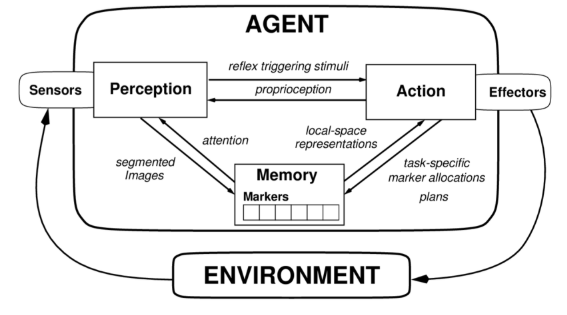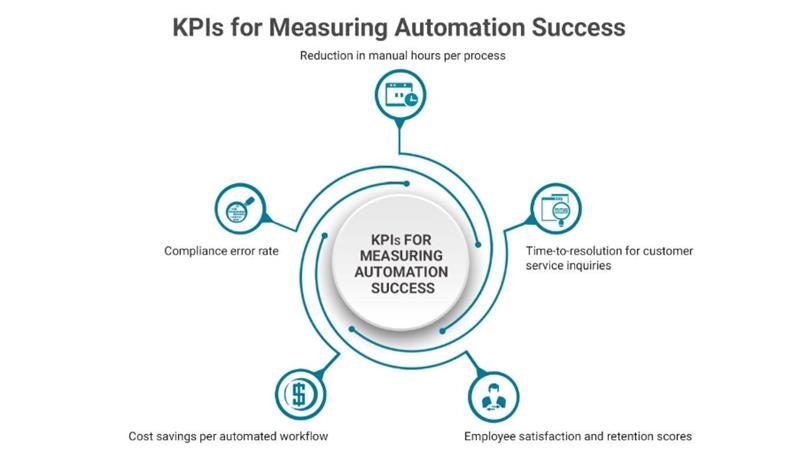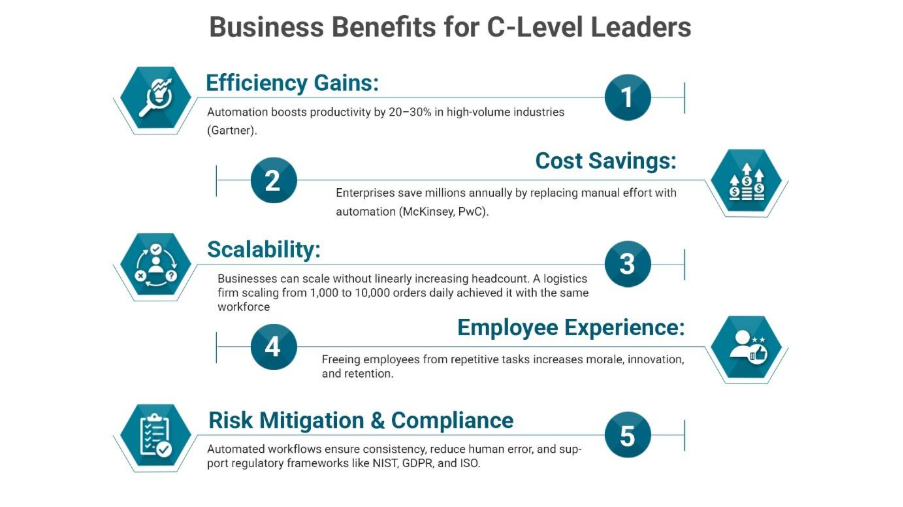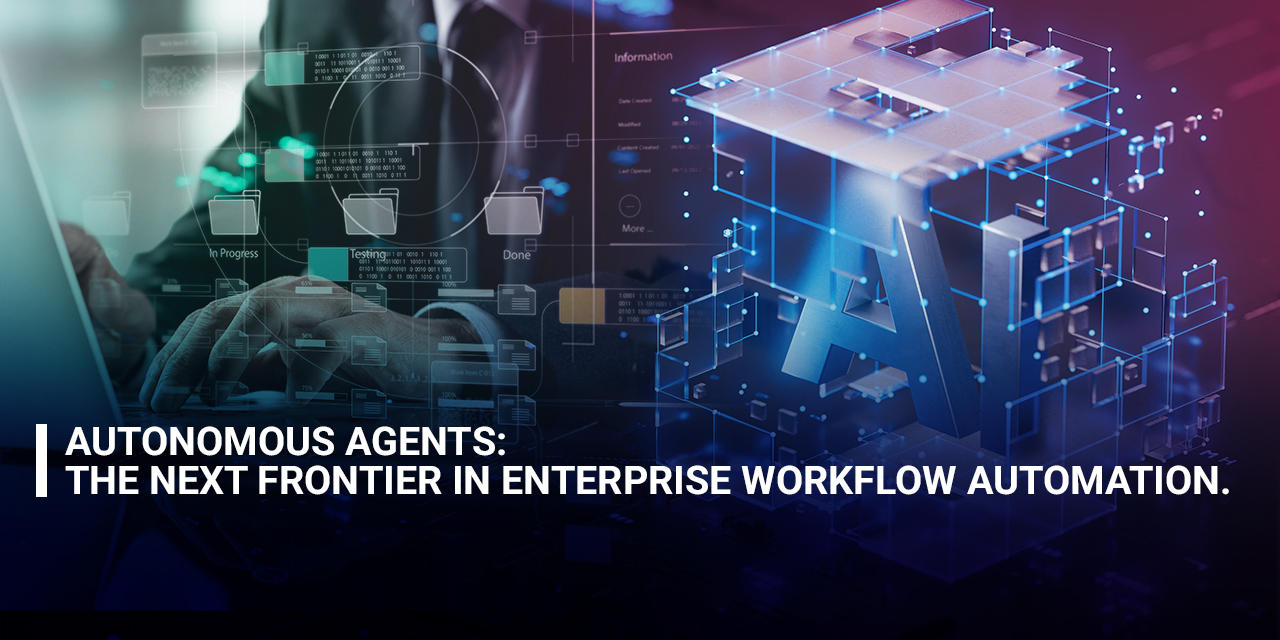Research
Share Knowledge
Brainstorm Ideas
Why Now? The Business Imperative for Automation
Operational complexity is increasing with global supply chains, hybrid workforces, and tighter compliance demands.
Cost pressures demand efficiency—manual processes are no longer sustainable.
Talent constraints: high-skilled employees are overloaded with repetitive work instead of driving innovation.
Competitive advantage is shifting to companies that harness AI to scale faster, serve customers better, and adapt quickly.
According to IDC, by 2025, 50% of enterprise workflows will be driven by hyper automation—a combination of AI, robotic process automation (RPA), and analytics.
What Are Autonomous Agents & Workflow Automation?
Think of them as your digital workforce:
1. Autonomous Agents:
AI-powered “digital colleagues” capable of making decisions and acting independently. For example, an AI assistant that reviews contracts, flags compliance risks, or manages customer inquiries without human intervention.
2. Workflow Automation:
Digital pipelines that connect enterprise systems and orchestrate processes end-to-end, such as invoice approvals, HR onboarding, or supply chain logistics.
Together, they help enterprises run leaner, faster, and smarter.

Why Now? The Business Imperative for Automation
Operational complexity is increasing with global supply chains, hybrid workforces, and tighter compliance demands.
Cost pressures demand efficiency—manual processes are no longer sustainable.
Talent constraints: high-skilled employees are overloaded with repetitive work instead of driving innovation.
Competitive advantage is shifting to companies that harness AI to scale faster, serve customers better, and adapt quickly.
According to IDC, by 2025, 50% of enterprise workflows will be driven by hyper automation—a combination of AI, robotic process automation (RPA), and analytics.
What Are Autonomous Agents & Workflow Automation?
Think of them as your digital workforce:
1. Autonomous Agents:
AI-powered “digital colleagues” capable of making decisions and acting independently. For example, an AI assistant that reviews contracts, flags compliance risks, or manages customer inquiries without human intervention.
2. Workflow Automation:
Digital pipelines that connect enterprise systems and orchestrate processes end-to-end, such as invoice approvals, HR onboarding, or supply chain logistics.
Together, they help enterprises run leaner, faster, and smarter.
Adoption Roadmap for Enterprise Automation
To maximize ROI and minimize disruption, enterprises should adopt autonomous agents through a phased strategy:
1. Pilot Phase:
Identify high-impact, low-risk areas (e.g., invoice processing, HR onboarding) and deploy agents to automate repetitive tasks. (Reference: McKinsey’s Automation Playbook)
2. Scale Phase:
Expand automation across departments, integrating agents with ERP, CRM, and data platforms. (Reference: Gartner)
3. Optimize Phase:
Continuously monitor agent performance, retrain models, and refine workflows using analytics. (Reference: IDC)
Integrating Autonomous Agents into Enterprise AI Strategy
Autonomous agents should not operate in isolation; they must be part of a broader AI strategy:
1. Complement Predictive Analytics:
Agents can act on forecasts to automate decisions (e.g., adjusting supply chain routes based on demand predictions).
2. Enhance Generative AI:
Agents can use generative models to draft reports, emails, or code snippets autonomously.
3. Support Decision Intelligence:
Agents can surface insights and recommend actions based on real-time data.
(Reference: Forrester’s 'AI Tech Tide')

(Reference: Deloitte’s 'Automation with Intelligence' report)
Real-World Use Cases That Drive Impact
1. Customer Service — Cutting Response Times in Half
A global e-commerce firm deployed AI-powered chatbots (Salesforce Einstein Bots) to handle high-volume inquiries. Routine questions like “Where’s my order?” are resolved autonomously, integrating with CRM data.
Impact: Response times dropped by 50%, support costs cut by 20%, and human agents focused on complex issues.
Executive takeaway: CX improved while operating costs decreased—an efficiency and loyalty win.
2. Supply Chain & Logistics — Reducing Errors by 15%
A manufacturing company adopted UiPath RPA to automate inventory updates and order tracking. The system integrated data from sensors, ERP, and suppliers without manual input.
Impact: Processing errors reduced by 15%, order cycle times cut by 25% (Deloitte).
Executive takeaway: Reduced risk of stockouts and increased customer satisfaction—critical for resilience.
3. HR Onboarding — Cutting Time-to-Productivity by 30%
Using Workday automation, a tech startup streamlined employee onboarding—document collection, background checks, and payroll setup.
Impact: Onboarding duration fell by 30%, and employee satisfaction rose by 20%.
Executive takeaway: Faster talent ramp-up in competitive labor markets.
4. Financial Operations — Saving $1M Annually
PwC reports that large enterprises using RPA for finance operations (e.g., reconciliations, compliance checks) saved over $1M annually (PwC).
Executive takeaway: Direct bottom-line impact plus improved compliance and audit readiness.
Competitive Benchmarking: Who’s Leading the Automation Race?
Understanding how industry leaders are leveraging autonomous agents can guide strategic decisions:
Amazon:
Uses AI agents for warehouse logistics and predictive inventory management.
JPMorgan Chase:
Automates contract review and compliance checks using natural language processing.
Siemens:
Integrates autonomous agents into its smart manufacturing systems for real-time decision-making.

(Reference: PwC’s 'AI Predictions' report)
Best Practices for Executives
Start with pilot projects in one function (finance, HR, supply chain).
Leverage low-code/no-code platforms to reduce IT burden.
Communicate a clear vision—automation is about augmenting, not replacing, employees.
Invest in reskilling programs to prepare teams for higher-value roles.
Forrester notes that phased adoption with effective communication reduces employee resistance by 40% (Forrester).
Trust, Security, and Governance
C-level leaders must ensure automation aligns with corporate values and risk frameworks:
Data Privacy:
AI agents overseeing customer data must comply with GDPR, HIPAA, etc.
Transparency:
Document decision logic for auditability.
Ethics & Bias:
Ensure fairness in AI-driven decisions.
Cybersecurity:
Autonomous agents integrated into core systems must follow zero-trust frameworks.
Top 5 Strategic Questions to Ask Before Deployment
1. What specific business outcomes are we targeting with autonomous agents?
Are we aiming to reduce operational costs, improve customer experience, accelerate decision-making, or enhance compliance?
Why it matters: Clear goals ensure alignment with enterprise strategy and help measure ROI.
2. How will autonomous agents integrate with our existing systems and data infrastructure?
Can they securely access ERP, CRM, and legacy systems?
Why it matters: Integration complexity is a major barrier to scale. Seamless orchestration is key to success.
3. What governance, compliance, and ethical safeguards are in place?
Are we aligned with frameworks like NIST AI RMF, ISO/IEC 42001, or GDPR?
Why it matters: Autonomous agents must operate within regulatory and ethical boundaries to avoid legal and reputational risks.
4. How will we manage change and prepare our workforce?
Do we have a communication and reskilling plan to support adoption?
Why it matters: Employee resistance can derail automation initiatives. Framing agents as augmentation—not replacement—is critical.
5. What metrics will we use to evaluate success and continuously improve?
Are we tracking KPIs like time-to-resolution, cost savings, error reduction, and employee satisfaction?
Why it matters: Continuous feedback loops are essential for optimizing agent performance and scaling impact.
The Strategic Takeaway
Autonomous agents and workflow automation are not “future tech”—they are delivering measurable value today across industries. Executives who embrace them will:
- Cut costs,
- Boost agility,
- Strengthen compliance, and
- Empower employees to focus on growth and innovation.
According to IDC, enterprises that delay adoption risk falling behind competitors that achieve 50% faster process cycles through automation.
In Conclusion
The question for CEOs, CTOs, and CISOs is no longer if automation will reshape enterprise workflows—but how fast you can adapt. The winners will be those who treat autonomous agents as strategic assets, not side experiments.
Just as ERP systems defined efficiency in the 1990s and cloud defined scalability in the 2010s, autonomous agents are poised to define competitive advantage in the 2020s. The choice before you is clear: lead the automation wave—or risk being disrupted by it.
How Can We Help?
ITPN has leading-edge capabilities and top-class expertise in quantum solutions development. We have highly skilled & trained developers and engineers in this nascent domain who have what it takes to deliver excellence and help businesses attain better ROI. Connect with us to learn more about what we offer or for any kind of assistance.

